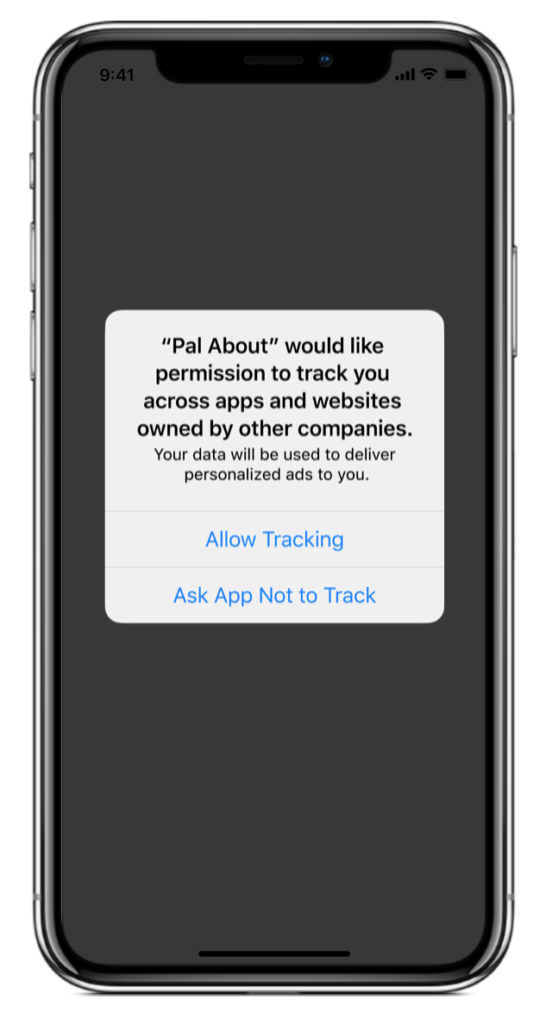App Commerce by Poq – July Round-Up 2020 – The ‘New Normal’

As lockdown measures continue to lift throughout July, we seem to be adjusting well to the ‘new normal’. This month we cover more evidence of what the ‘new normal’ for shopping looks like online and in-store, especially for baby boomers and beyond. We also discuss the latest in Apple’s iOS14 update and how marketers could be affected by the changes.
Keeping up with Apple
Last month in a bold move for user privacy but a potentially daunting move for marketers, Apple announced changes to it’s Identifier for Advertisers (IDFA). Although not completely removed, this identifier – which enables marketers to attribute ad spend across apps on the App Store similar to Google’s Advertising Identifier (GAID) – will now explicitly require an opt-in for every app.
App users will now be shown a dialogue box (like the one shown below) to gain a user’s permission through the AppTrackingTransparency framework to track them or use the IDFA. By now defaulting to an opt-in system, this will surely result in many users opting not to enable these identifiers and tracking. This causes a big issue for retailers trying to attribute ad spend.

Across the industry, MMPs (Mobile Measurement Partners) are looking for alternative methods to measure and attribute ad spend and how to improve opt-in rates. Get a more in-depth understanding of the changes Apple have made and why, and how marketers can prepare to make sure your app marketing strategies don’t suffer in our latest webinar from our App Marketing Specialist, Sheenu Aggarwal.
Speaking of ads, social media plays a big role in retailer’s advertising strategies and TikTok – the home for short-form videos – announced it launched TikTok For Business. Helping small businesses get back to normal, TikTok pledged $100m in US ad credits for businesses to use to reach their customers on the platform. Encouraging businesses that might not have considered investing their ad spend on TikTok, to try out the platform.
Generation Zoom
In light of the pandemic, video conferencing has now become the new norm for staying in touch with friends and family. Now more mature generations are comfortable with using online services like Zoom – which downloads jumped past 300M in Q2 to surpass TikTok. This has caused ‘e and m-commerce goalposts have shifted again: now retailers need to look not just at how to engage consumers through the usual channels, as well as on social, but also how to make these services more attractive’ according to InternetRetailing.
Hear experts from the likes of Hotter Shoes and Cotton Traders discuss this topic at Poq’s first virtual event: AppCommerce Virtual Festival.
Digital Transformation
COVID-19 has undoubtedly been a catalyst for many retailers to embrace and invest in digital transformation and those businesses who had invested in their digital transformation strategy pre-COVID certainly reaped the rewards. And now more than two-thirds of retailers see digital transformation as essential to retail. Let’s examine the behaviour that’s driving this need for digital transformation.
The ‘New Normal’ In-Store
Shoppers who now head to the stores are doing so with purpose. Meaning they’re heading to a store, list in hand, with a specific idea of what they want to buy. Minimal browsing and interactions, and shoppers avoiding unnecessary contact with products, means retailers will have to rethink the role their stores play in their multichannel strategies. This limitation of contact carries through to payments in-store too. According to Barclaycard, 90% of face-to-face transactions were made contactlessly in April and cash payments continue to decline. But how has COVID-19 impacted how we choose to shop online?
The ‘New Normal’ Online
More shoppers feel comfortable shopping online (67%) compared to in-store (29%). Of those shopping online, 53% have discovered new brands during lockdown and 56% now say they plan to do more product research online before buying in-store. As the consumers have made the move away from shopping in-store, it’s predicted that one-quarter of the UK’s whole population will make the move to shopping online permanent.
According to App Annie, a monthly all-time high of more than 200 billion hours were spent in mobile apps globally in April 2020. And users spent on average 4 hours and 20 minutes a day on mobile. Meanwhile, consumers alone downloaded 35 billion apps in Q2. Additionally, over Q1, weekly time spent in apps was up 20% year-on-year and shopping app engagement was up 40% in March year-on-year.
With this movement towards apps, a recent Forbes article makes a good argument that speciality retail apps could outperform Amazon in terms of customer experience. Smaller retailers often have the ability to create unique, personalised and specific brand experiences, differentiating themselves from the likes of Amazon and Walmart. And fluctuations in app store rankings can see them compete with the dominating retailers too. And these online experiences have never been more important for brand loyalty. Recent research has shown that ‘58% of UK shoppers say that if a retailer had poor product information on its website, they would go elsewhere’ and 29% said that personalised content makes them feel more valued and hence more likely to purchase again. With 60% of 16-24 year-olds showing little tolerance for poor digital experiences, retailers can’t afford to overlook their digital channels.





